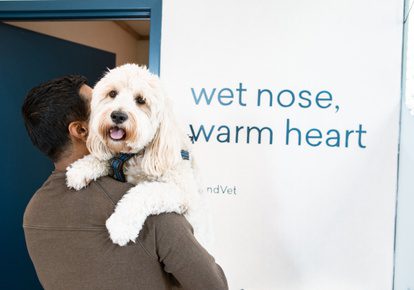
How to choose the right food for your dog
When choosing a dog food, you may be surprised by the sheer number of offers. With so many brands and formulas available, it can be hard to decide which one is the best. But there are a few things to consider when choosing the best option for you and your dog.
The old adage “You are what you eat” also applies to dogs, so it’s important to remember the important role of nutrition in their lives. Proper nutrition helps your pet grow and stay strong, support the immune system, keep the coat healthy and provide energy for play. There are a few key factors to keep in mind when you’re researching ingredients and choosing a food.
Contents
Balanced Nutritional Formula
When choosing the best pet food, nutritional value is the first thing to look at. The Association of American Feed Control Officials (AAFCO) has developed guidelines for regulators that define the ingredients that a pet food company must list on packaging. A balanced diet should contain healthy ingredients such as animal proteins, vegetables, grains, and micronutrients such as omega-3 fatty acids.
When it comes to individual ingredients, it is important to note that a single ingredient product must contain at least 95 percent of that ingredient, excluding water. For example, if the formula states that a food is made exclusively from beef, beef must be 95 percent of the food. The next thing to consider is the type of food. If the food packaging contains the words or labels “lunch”, “dish” or “first course”, the product must contain at least 25 percent of the declared ingredient. Therefore, a chicken dinner can only be 25 percent chicken.
Dog food comes in dry, canned, dehydrated, and even frozen. You must decide which species will have the highest nutritional value for your dog and make sure he enjoys it. For example, freezing food can change the taste of the food, and it is possible that the dog will be reluctant to eat such food.
Once you’ve determined the ingredients that should be in the food and those that shouldn’t be, trust your dog with the choice of taste. The best dog food is a perfectly balanced food that your dog will love to eat!
Age and lifestyle
Your dog is unique and should be treated accordingly. This means that what is ideal for one dog may not be ideal for another. The first criterion for choosing food is the size of the animal. Great Danes and Chihuahuas need different amounts of nutrients and different amounts of food in general. Dry food kibbles come in different sizes depending on the size of your dog, so look for food that is tailored to your dog’s size.
The next criterion is age. A puppy that is still growing and an older, sedentary dog have very different nutritional requirements. Puppies generally need vitamins and minerals that promote healthy growth and development, while older dogs require fewer calories but supplements to support aging bones and joints. Again, a Great Dane puppy will need nutrients to support a very large, fast growing body, and a Chihuahua puppy’s needs will likely not change much throughout its growth period.
Pregnant and lactating dogs require special food to support their bodies and the bodies of puppies. For example, a pregnant dog needs a calorie-rich food because she spends a lot of energy on her puppies. In order for a puppy to grow up healthy, he needs special nutrients, proteins and docosahexaenoic acid. If your pet is pregnant or nursing puppies, be sure to ask your veterinarian what kind of food to give her.
The amount of food and nutrients your four-legged friend needs depends on his lifestyle. Working dogs, such as police dogs or those involved in search and rescue operations, are constantly on the move. The load on their body is great, and to compensate for such energy costs, they need a lot of nutrients. A working dog needs much more food than a homebody dog.
The less your dog moves, the fewer calories he needs, according to PetMD (Pet Health and Pet Nutrition Information). If you want to prevent obesity and keep your dog at a normal weight and health throughout his life, you must first choose a diet that takes into account his individual characteristics.
Ailments and diseases
Some diseases require changes in the animal’s diet or even a change to a different food. There are many foods specifically for dogs with certain medical conditions, such as diabetes or kidney failure. These foods have been developed by veterinarians and scientists to provide the ideal nutrition for animals suffering from these diseases. They contain ingredients known to help treat and correct diseases and ensure your dog gets the right nutrition at the right time. In some cases, after the procedure or during the recovery period, the pet needs to be given special food, and only then transferred to a regular diet. (Remember, if you are switching from one food to another, you should do it gradually.) In other cases, such a special food can become the basis of a dog’s diet for the rest of his life. What suits your dog best depends on his condition and the expert opinion of the veterinarian.
What is the best dog food?
So, is there a food that is suitable for all dogs at once? Answer: no. The choice depends on many
factors. All animals are different. Consider your dog’s age, lifestyle, and health issues to find the best food for him. One of the most important things to consider when choosing the most suitable food is the love and care that the manufacturer has put into it. Does this company do research to improve the food? Does it involve qualified veterinarians and nutritionists to assess the quality of the feed? Does he only buy dog food ingredients from trusted suppliers? Does it adhere to strict quality and safety standards? When choosing the most suitable food for your dog, consider not only its composition, but also many other things.
Finally, never follow fashion trends that come from unqualified, untrustworthy sources. This applies to ideas about nutrition – both people and dogs. In this information age, you have many opportunities to learn everything about the food you choose. Compare dog food yourself, consider nutritional value, cost, composition, production and quality standards, company experience in the food industry, and more. You know your dog best and want only the best for him, so take the time and effort to choose the right food. If you are still unsure, check with your veterinarian. He can give you advice and tell you what nutrients your dog needs for his health. To make the right decision, take into account both his advice and what you yourself have learned.
If you have any questions about Hillspet products, please contact us: https://www.hillspet.ru/contact-us






